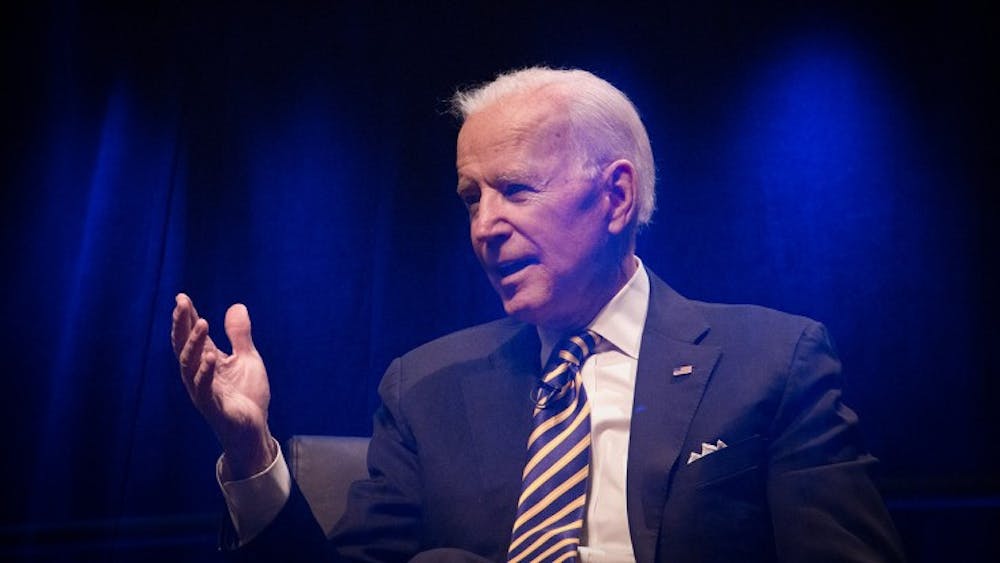Nearly a year ago, when the 2020 presidential election was called for Joe Biden, The Herald reported that community members expressed cautious optimism about the change in office, looking forward to the promises Biden had made on the campaign trail regarding key issues including the COVID-19 pandemic, climate change and foreign policy.
The Herald asked four faculty members about their thoughts on the current state of the nation one year into the Biden administration. They praised some of Biden’s policy efforts but called for more dramatic action in certain areas.
Domestic policy
On the domestic front, Director of the Taubman Center for American Politics and Policy and Professor of Political Science Wendy Schiller characterized the Biden administration as “ambitious” in its efforts to uphold the core Democratic Party principle of bolstering the social safety net for working families.
Professor of Political Science Richard Arenberg also emphasized that the administration has prioritized infrastructure and social relief domestically, pointing to a bipartisan infrastructure bill and social spending bill, which he said were “very likely” to pass, as “underestimated accomplishments.”
Assistant Professor of International and Public Affairs and Education Jonathan Collins said he hopes the administration follows through on many of the promises Biden made on the campaign trail. With the passing of the infrastructure bill in the House of Representatives, Collins commended the administration’s willingness to tackle multiple forms of policy through legislation.
The infrastructure bill would be the most significant package since Lyndon B. Johnson’s Great Society programs of the 1960s, Arenberg and Collins noted.
The most telling divergence between the previous Trump presidency and the Biden presidency has been the choices for Secretary of Education, Collins argued. “The move from Secretary (Betsy) DeVos to Secretary (Miguel) Cardona has been night and day,” he said.
Cardona, secretary of education under the Biden administration, is committed to high standards for student education, and there’s more commitment to understanding the unique challenges that confront students who areEnglish language learners and are from low income households, Collins said.
Although he commended the administration for pausing payment on federal student loans, Collins said that more ambitious student loan debt reform is warranted, and that the administration should expand its policy efforts.
“The thing that we hope to see from the administration is this continued major investment on key issues like education,” Collins said.
Arenberg noted that the bipartisan infrastructure bill would also confront climate change issues, though its policies could be more dramatic.
The course of the remainder of Biden’s presidency depends on the congressional elections next year, he said. If Democrats retain both the House and the Senate, Arenberg said he expects that Biden will pursue aspects of his agenda like prescription drug pricing reform and paid family leave, he said.
“If the Democrats lose control (of) either the House or Congress, in these days of hyper-partisan polarization that we have been experiencing, it’ll be very difficult to keep up,” Arenberg said.
Foreign policy
Arenberg noted that an area of difficulty for the Biden administration in foreign policy was the withdrawal of troops from Afghanistan. He argued that Biden deserves credit for making the decision to stick by the agreement that Trump made to withdraw the troops.
“It was somewhat of an intelligence failure not to recognize the speed with which the Taliban would take over once American troops started to withdraw,” Arenberg said.
The withdrawal of troops was the right policy, but was badly implemented, said Professor of International Relations Rose McDermott.
Some nations, such as France and the United Kingdom, “felt like they weren’t properly notified (about the withdrawal),” McDermott said. “The policy was correct and the implementation was botched.”
Still, McDermott noted that other aspects of the Biden administration’s operations hold the potential to better the American relationship with the international community. “I do think that Biden, ratcheting down the tone, not being on Twitter 15 times a day with antagonistic and hostile and angry communication, starts to make things easier” with European allies, McDermott said. “That matters, and it matters in ways that are hard to measure, but it has an impact on the overall tenor of international relations.”
The next three years
Given the challenges posed by the COVID-19 pandemic, Schiller noted that the Biden administration worked hard to better a public health situation it inherited in a particularly tumultous time.
“He’s done extremely well and (has been) standing firm on (public health concerns caused by the pandemic) by making vaccines widely available,” Schiller said. The administration’s firm stance was strengthened by its usage of “federal powers of mandates to make sure to send the signal that this is a public health emergency.”
Overall, Biden sees his personal mission as restoring stability and predictability to the office, Schiller said.
The president can’t accomplish everything on his own because Congress controls lawmaking, McDermott said. By working to restore collaboration, she said she thinks the Biden administration will bring about more positive change.
A distinguishing characteristic of Biden is that he has suffered through multiple tragedies in his life and it impacts the way he leads, Schiller said. “He seems to me to have a moral fortitude where he is really certain that what he’s trying to do is the right thing to do for as many people as possible,” she said.
“That’s something we haven’t seen in a long time,” Schiller said, “that kind of moral strength.”
Grace Holleb was a University News editor covering academics and advising.





